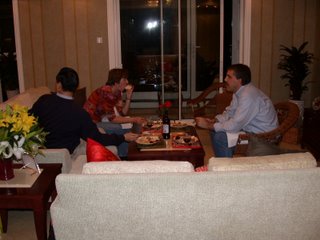The meal was very much a traditional American Thanksgiving. There was turkey and gravy, mashed potatoes, stuffing, yams, green beans, cranberry sauce, a mixed vegetable dish with broccoli, carrots, and zucchini, and a fruit salad. For dessert, we had cherry pie with vanilla ice cream.
 This is (clockwise from front left) BG, ZC (who works with us from Shanghai but was in town for meetings), FL (our real estate helper and general fixer), and PG (who runs the technical side of our operation).
This is (clockwise from front left) BG, ZC (who works with us from Shanghai but was in town for meetings), FL (our real estate helper and general fixer), and PG (who runs the technical side of our operation). And here’s the kids’ table. That’s HX with his back to us (our main financial guy), KW, an empty chair where I was sitting before I got up to take this picture, and TG, who will work with BG on the ticket events and just arrived on Sunday. He’ll be moving into an apartment here at Seasons Park next week.
And here’s the kids’ table. That’s HX with his back to us (our main financial guy), KW, an empty chair where I was sitting before I got up to take this picture, and TG, who will work with BG on the ticket events and just arrived on Sunday. He’ll be moving into an apartment here at Seasons Park next week.I’m sticking with just initials out of respect for everyone’s privacy. I’ve chosen to share my experiences here on this blog, but nobody else signed up for that. Obviously I’m posting pictures of them, and I’ve made sure they were okay with it, but it just doesn’t seem right to throw them out into the cybersphere.
I’ve mentioned a few times how inexpensive many things are here, and with the protests in Australia at the economic conference recently, not to mention the whole WTO thing in Seattle years ago, I can't help but think about the economic reality of me being here. When I go to the store and see local people buying food, I know that for some of them, even the ridiculously low prices might seem burdensome. If a taxi driver gets only $3 for taking me halfway across town, a dozen eggs for $2 must seem expensive, considering that the price of gas is close to the same as in the US (around $2.50 gallon equivalent, I’m told). I’ve never thought of myself as rich or even highly paid, but compared to most of the people around me, I am. Is this disparity fair? Of course, it’s reality, so fairness might not figure into it, but I have to feel good about the choices I make in my life, so I ask questions like that.
If eggs and everything else cost as much here as they do in Seattle, few Chinese would be able to afford them. The fact that my apartment actually does cost as much as it would in Seattle only goes to show that there is a growing class here that can afford it, as well as a considerable number of foreign residents. The way I see it, my presence here is part of a process that leads the Chinese people closer towards that economic parity that would have to exist for prices to be equal. Every dollar I spend here is money that in a small way makes these people richer. It’s a win-win situation. I get to take advantage of the disparity while they get a piece of my wealth. How else are things supposed to get better? Restricting international trade seems like it only slows down the improvements. But it is a fine line between collaboration and exploitation when the imbalance is so extreme.
There was a story on the news recently about the Chinese government encouraging its people to spend more, to save less, to help drive the economy. First, from the crowds I see shopping everywhere and all the trendy clothing I see, I don’t think Beijingers need to be told that. Second, one of the things that often bothers me about American society is how materialistic we are, and how wasteful. Do we really need to buy a new car every three years? All the stuff we buy, use for a short time, and then discard when it’s still functional – so much of it ends up in landfills, using up resources inefficiently, and cluttering our world. Do we really need the people of the world’s most populous nation following that example? Is there a better way? Can you have prosperity without waste?
The other day I was walking around my neighborhood and encountered more people begging for money than I have previously seen here. All along Gongrentiyuchang across from Workers Stadium, which apparently hosts an open-air market on the weekends, there were women with little children that ran up to me and tugged on my pant leg, following me for a long time. It made me very uncomfortable. Last night I was talking to ZC about it after dinner, and she said that in many cases beggars are frauds, borrowing other people’s children for their scams, and going back to decent homes at the end of the day and changing out of their dirty clothes. There are even stories of people intentionally maiming themselves in order to get more sympathy begging. I don’t know how to react to these kinds of stories.
Like I often say, it’s a big world full of many people, and they all have their own ways of living.

No comments:
Post a Comment